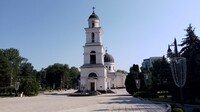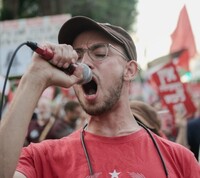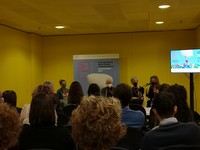Gli obiettori di coscienza per la pace nel Mediterraneo
Riproduciamo qui una dichiarazione, firmata da un gruppo di obiettori di coscienza di quattro paesi (Egitto, Israele, Grecia e Turchia) del Mediterraneo orientale - una regione nella quale la guerra e la militarizzazione della società stanno seminando morte e distruzioni -.
Il documento lancia un appello per la pace e la giustizia internazionale, per porre fine alla coscrizione obbligatoria, alla persecuzione e alle pene detentive per gli obiettori di coscienza, alla accoglienza dei rifugiati che emigrano dalle aree di guerra.
Statement of conscientious objectors’ groups and individuals from eastern Mediterranean region
We are conscientious objectors from all around the eastern Mediterranean region. Our region has suffered for so long from oppression, injustice, militarisation, military occupations and wars, as well as poverty, illiteracy, hunger and lack of social infrastructure. In this difficult period, when our region seems to fall even more into the chaos of war, we raise a common voice for peace and against militarisation.
We refuse to allow this cycle of violence, initiated by oppressive states and economic interests, to continue; we refuse to be a part of it; we refuse to be enemies with people who just happen to be of a different nationality or religion; we will not be dragged into their wars and armies leading to death and destruction in the region. Our region is one of the most militarised regions in the world, from forced conscription across the region, through highly militarised borders and militarised solutions to any conflict, to ongoing and new occupations of civilian populations by armed forces killing and oppressing men, women and children. We believe that this violence is systematic and affects the entire region, but it is not inherent to it, and it is not our choice as residents of this region who wish to live in peace. Our region has proved time and time again that military solutions are never sustainable and only lead to greater violence in the long term, while bringing death and destruction in the short term.
The world's reaction to the current regional violence should be building societies, assisting refugees, and mediating between fighting parties, not selling arms, bombings and providing military assistance.
The wars in our region have led to the worst refugee crisis since World War II, with millions of people escaping from wars and oppression, only to find racism, repression or even death while trying to reach a safer place. This crisis has led to militarised “solutions” such as international military engagement and assistance, and militarisation of borders. “Solutions” that treat refugees as a security threat and only increase war and chaos in the region. We express our solidarity with refugees, we welcome them and we declare that we will continue to refuse to “guard borders”, leading to death and imprisonment of (tens of) thousands of refugees in the region.
Although in many countries, conscientious objectors are seen by the army, the state or even parts of society as a “threat”, nowadays it is clearer than ever that the threat to our societies does not come from people who refuse to participate in wars and armies, but from militaries and wars.
We express our solidarity with conscientious objectors currently persecuted by Israeli, Turkish and Greek military authorities, and we demand an end to their prosecution or imprisonment.
We are resisting conscription, exercising our internationally recognised right to CO (despite thepersecution faced in many states in our region), and demonstrating solidarity with those effected by war. We will cooperate across the region to:
• support all those who oppose wars by refusing military service and war participation for any reason, be it political, philosophical, religious or other
• stop the persecution of COs
• abolish conscription
• Though campaigning against conscription, we do not wish for conscription armies to be replaced by professional ones, as these too are not the solution to the problems of our region.
Finally, despite our different backgrounds, ideologies and views on the ways to struggle for liberation, we agree that our final goal is peace with justice for all. We all share a commondream for a world where all people would share equal rights, and call you to join us in this dream, and refuse to participate in its further destruction.
Articoli correlati
 Oryan, Itamar e Yuval
Oryan, Itamar e YuvalNuova condanna al carcere militare per tre obiettori di coscienza israeliani
Nonostante il clima di guerra nel paese, Mesarvot, la Rete israeliana di obiettori di coscienza israeliani, continua a sostenere chi rifiuta di servire nell'IDF, l'esercito israeliano. Itamar Greenberg si è detto convinto di appartenere a una generazione che porrà fine all’occupazione dei territori9 settembre 2024 - Mesarvot Dispaccio dall'inviato di Pressenza in Ucraina, ma che ora si trova in Moldavia
Dispaccio dall'inviato di Pressenza in Ucraina, ma che ora si trova in MoldaviaL’Ucraina non è un Paese per obiettori di coscienza
Dopo aver finalmente incontrato a Kiev l’obiettore di coscienza Yurii Sheliazenko, che il 27 agosto andrà a processo, mi consulto con Anna Polo della redazione di Pressenza e decidiamo che è meglio lasciare il territorio ucraino prima di pubblicare il testo dell’intervista, nonché questo seguito.26 agosto 2024 - Mauro Carlo Zanella Parla un obiettore di coscienza israeliano
Parla un obiettore di coscienza israelianoYeheli Cialic: “Israele, non possiamo restare a guardare. Il silenzio è complicità”
Yeheli Cialic è il coordinatore di Mesarvot, una rete di giovani obiettori di coscienza israeliani. Lo abbiamo incontrato e intervistato a Bologna, dove ha partecipato a un evento organizzato da Assopace Palestina.30 aprile 2024 - Teodoro Palpacelli Migranti e diritti
Migranti e dirittiI 60 anni di Amnesty International a "Più Libri Più Liberi"
Spegnere la luce sui fatti può essere una grave violazione dei diritti umani. Ne parlano due giornaliste, un artista e un attivista14 dicembre 2021 - Lidia Giannotti
Commenti
Inserisci il tuo commento